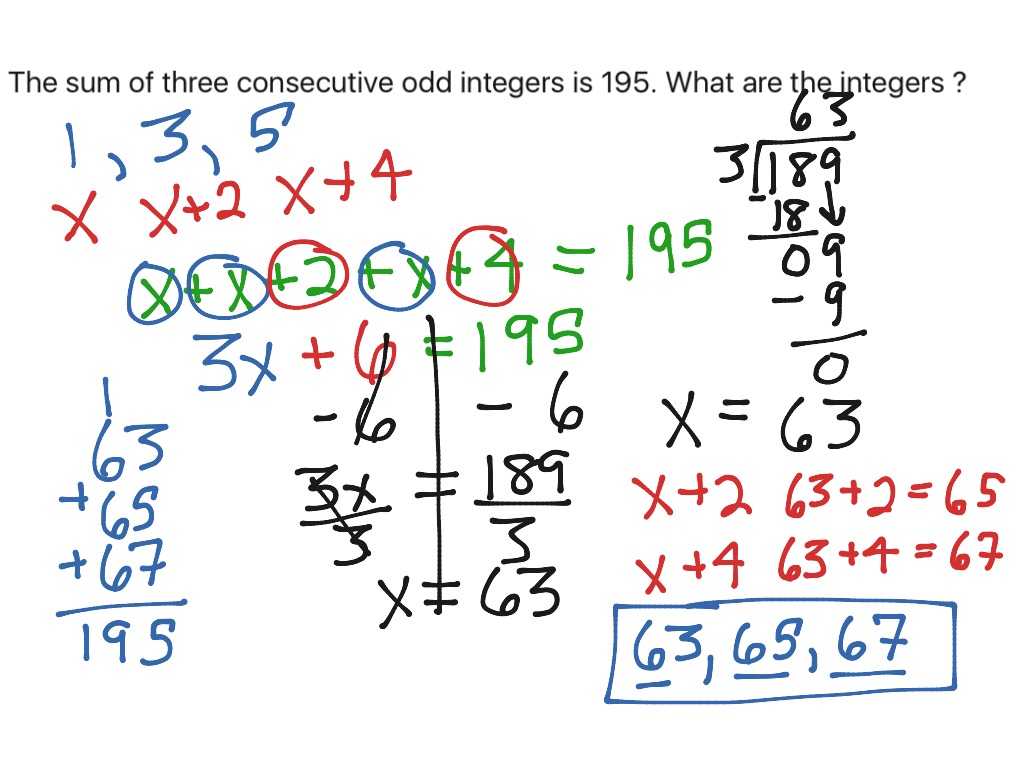Sum Of Three Consecutive Integers Calculator. Find three consecutive integers whose sum is 663. Back to the problem we want to solve:

This calculator calculates consecutive integers based on the given sum and the number of consecutive integers. The formula to calculate the sum of integers is given as, s = n (a + l)/2, where, s is sum of the consecutive integers n is number of integers, a is first term and l is last term. Here n is an integer.
So, We Can Use 2 * N + 1 To Represent The First Odd Integer, Then The Second Odd Integer Is 2 * N + 3.
The sum of integers from 1 to 500 can be calculated using formula, s = n (a + l)/2. The answer came out, the sum of 3 consecutive even integers is 36, these three even integers are 10, 12 and 14. This calculator calculates consecutive integers based on the given sum and the number of consecutive integers.
This Is The Most Common Method, Let’s Look At The Second Method, Which Is My Favorite Method.
Quickly calculate the sum of numbers in your browser. How do you find the sum of all integers from 1 to 500 using sum of integers formula? Introduction a positive integer n cubed always can be represented as the sum of consecutive odd numbers.
As An Example, The Factors Of 20 Are 1,2,4,5, And 10.
What is the sum of 3 consecutive odd integers whose mean is 27 act. N(n + 1) / 2. Here n is an integer.
Consecutive Integes Formula Let’s Start With An Example:
Abstract understanding and proving a proposition known to the early greeks: For another example, the sum of 5 consecutive odd integers is 135. Consecutive integer word problems video.
M Represents The Number Of Consecutive Integers.
The formula to calculate the sum of integers is given as, s = n (a + l)/2, where, s is sum of the consecutive integers n is number of integers, a is first term and l is last term. For example, the sum of 3 consecutive odd integers is 30, find these odd integers. The cube of every positive integer is a sum of consecutive odd integers.
Related Posts
- Right Trapezoidal Prism Surface Area CalculatorRight Trapezoidal Prism Surface Area Calculator. L = ph = (25.7) (12) = 308.4 we have part of the surface area. (base 1 + base 2) / 2 is actually the ...
- Express The Limit As A Definite Integral CalculatorExpress The Limit As A Definite Integral Calculator. This definite integral will be the limit of these riemann sums as an approaches infinity. Calcul ...
- Greatest Monomial Factor CalculatorGreatest Monomial Factor Calculator. Gcf of polynomials x^2+2x+1 , x+1 gcf of polynomials 110x^5 , 70x^7 , 60x^8 Here we shall discuss factoring one ...
- Area Of A Octagon CalculatorArea Of A Octagon Calculator. Area of an octagon = 2a2(1+√2) 2 a 2 ( 1 + 2) where ‘a’ is the length of any one side of the octagon. Follow the below ...
- What Are Three Parts Of A NucleotideWhat Are Three Parts Of A Nucleotide. A nucleotide is made up of three parts: Rna contains uracil, instead of thymine.Draw And Label The Three Parts ...
- Two Consecutive Integers CalculatorTwo Consecutive Integers Calculator. N + (n + 1) = n + n + 1 = 2 * n + 1 this formula can also be understood as that the sum of two consecutive integ ...
- The Three Ethical Principles Discussed In The Belmont Report AreThe Three Ethical Principles Discussed In The Belmont Report Are. Broader ethical principles will provide a basis on which specific rules may be form ...

